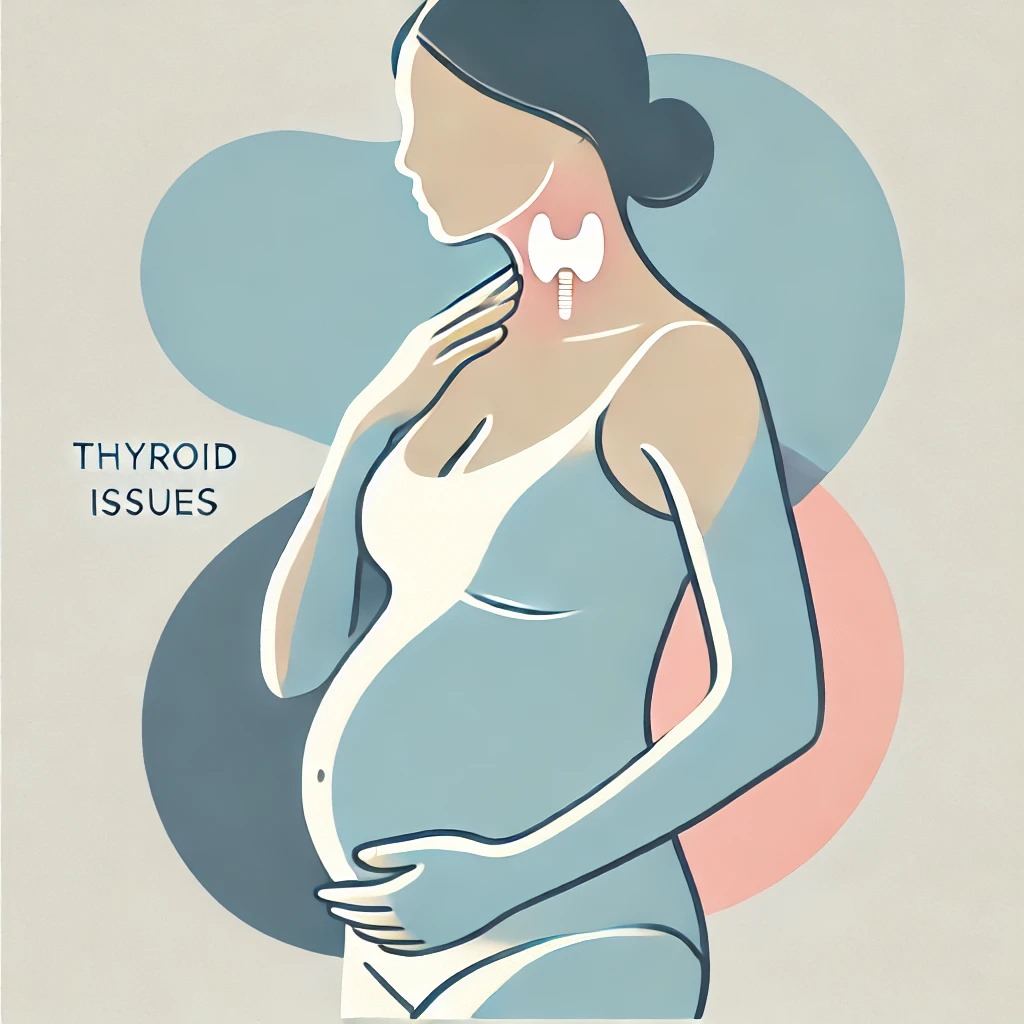Thyroid disease is the second most prevalent endocrine disorder in women of reproductive age group. If left undiagnosed or untreated, it can lead to serious complications such as miscarriage, preterm birth, Hypertension , Eclampsia, premature separation of the placenta from the uterus ( Abruptio placentae), anaemia and intrauterine growth restriction of the baby. This makes it important to be very vigilant about the signs & symptoms of thyroid disease and to treat them promptly in pregnancy to ensure a healthy outcome for the mother as well as the baby.
The thyroid gland is located in the front of the neck and is responsible for production of thyroid hormone which deals with metabolism and utilisation of energy by various cells of the body. During pregnancy, the development of the brain and nervous system of the baby is dependant on the adequate availability of the thyroid hormones to the fetus. Thus pregnancy puts an additional demand for the thyroid hormone on the mother, which is normally met with by increasing its production and circulation under the influence of the hormones Human chorionic Gonadotropin & the Estrogen. The fetus receives the thyroid hormones from the mother through the placenta and also starts to produce its own thyroid hormone by the 12th week of gestation. Even so, the baby remains dependant on the mother throughout the pregnancy for an optimum supply of Iodine which is necessary for thyroid hormone production.
What are Hypothyroidism and Hyperthyroidism ?
Hypothyroidism refers to an underactive thyroid gland which is not producing sufficient thyroid hormone in your body. This is usually detected by a blood test revealing a high TSH and a low FT4 value.
Hyperthyroidism refers to an overactive thyroid gland which is producing excessive thyroid hormone . This is diagnosed by the blood tests showing a low TSH and a high FT4 value.
How do I know whether I have a thyroid problem in pregnancy ?
Hypothyroidism can present with one or more of symptoms such as fatigue, weight gain, constipation, decreased exercise capacity & lethargy, drowsiness and pain/tingling in fingers or hand ( Carpal tunnel syndrome ).
The symptoms of Hyperthyroidism may be sweating, palpitations, nervousness, diarrhoea, heat intolerance , irritability/anxiety, insomnia and hypertension.
To complicate the situation further, these symptoms may also be present in normal pregnant women who do not have a thyroid problem . This makes it quite challenging to detect thyroid disease in pregnancy. Hence the best way to identify a thyroid problem in pregnancy is by checking the values of TSH ( Thyroid stimulating hormone ) and Free Thyroxine ( FT4) in blood tests. These values should be interpreted with caution during pregnancy as the cut-off for TSH is lower as compared to non-pregnant stage and may range from 0.1- 2.5 mIU/L in first trimester to 0.2 or 0.3 – 3.0 mIU/L in the second and third trimesters. The FT4 values may range from 0.8- 1.2 ng/dl in first trimester , 0.6-1.0 in second and 0.5 – 0.8 ng/dl in third trimester.
Certain women maybe at a high risk of developing thyroid disease in pregnancy :
- Women who are on thyroid medication before pregnancy
- Family history of auto-immune disease
- Goiter
- History of high dose neck radiation
- History of post partum thyroid dysfunction in previous pregnancy
- Type 1 Diabetes Mellitus
- Tumours of Pituitary gland , thyroid or ovary
- Grave’s disease
- Viral thyroiditis ( viral infection of thyroid gland)
- Gestational trophoblastic disease
- Hyperemesis gravidarum ( Excessive , pathological vomiting in pregnancy)
How does Hypothyroidism or Hyperthyroidism affect my pregnancy ?
The fetal brain development is closely linked to the presence of adequate supply of thyroid hormone. In the first 12 weeks of pregnancy, the fetus is solely dependant upon the mother for the supply of thyroid hormones and hence it is important that your thyroid function is optimum before & during pregnancy. A deficiency of thyroid hormone may lead to a retarded growth & mental development in the fetus and also increases the risk of miscarriage, premature delivery, pre-eclampsia and stillbirth.
An excess of thyroid hormone, on the other hand, may also increase the risk of miscarriage, placental separation, premature delivery, low birth weight baby, pre-eclampsia and stillbirth. It may also lead to a serious complication called ‘thyroid storm’ for the mother as well as increase the risk of a number of complications in the newborn.
How are thyroid disorders treated in pregnancy ?
Fortunately, the treatment for thyroid problems in pregnancy is quite simple once they are diagnosed. Hypothyroidism is treated by medications containing synthetic thyroid hormone in the form of Levothyroxine. It should be remembered that thyroid hormone requirements are known to increase during pregnancy and hence your doctor may advise you to get regular Thyroid function tests done at 4-6 weeks interval in pregnancy in order to adequately titrate the dosage of the medication. Women who were hypothyroid before pregnancy & were already taking a Levothyroxine medication may need to increase the dosage based on the test results . This requirement may come down to pre-pregnancy levels after delivery and then the dosage may be reduced again. Of course, all this should be done under strict medical supervision and after consultation with your doctor.
Mild Hyperthyroidism may be managed sometimes with close monitoring only without starting any medication provided that both the mother & baby are doing well. Modertae to Severe hyperthyroidism may need to be treated with anti-thyroid medications, of which, PTU ( Propylthiouracil ) is the drug of choice in pregnancy. Here again, your doctor would need to closely monitor the Thyroid function tests during pregnancy so as to keep your FT4 & FT3 values in the high-normal range with the lowest possible dose of anti-thyroid medication.
What is the prognosis for thyroid disease after delivery ?
The dosage for Levothyroxine usually needs to be reduced and eventually tapered off in most women after delivery. Women who were on medication before pregnancy may return to their pre-pregnancy dosage depending upon their thyroid function tests.
The Grave’s disease leading to Hyperthyroidism is likely to worsen in the first 2-3 months after delivery and hence the dosage of the medication may need to be adjusted . It is important to continue monitoring the thyroid function for a few weeks after delivery.
Another condition, called Post-partum thyroiditis may sometimes develop in some women after 1-4 months of delivery , in which, there is inflammation of the thyroid gland post-partum . This leads to a phase of hyperthyroidism for a few weeks followed by hypothyroidism for the next 9-12 months. It is more common in women who have auto-immune disease or have anti-thyroid antibodies. Although many of these women eventually regain normal thyroid function, about 20% may remain hypothyroid even afterwards.
Thyroid disease in pregnancy is thus an easily treatable condition provided it is diagnosed properly and hence it is important to remain under close medical supervision during your pregnancy. In case you have any symptoms suggestive of a thyroid dysfunction, do not hesitate to discuss them with your doctor & take adequate treatment.
References :
-http://www.aafp.org/afp/2014/0215/p273.html
-http://www.thyroidawareness.com/the-thyroid-and-pregnancy
-https://www.thyroid.org/thyroid-disease-pregnancy/
-https://www.thyroid.org/wp-content/uploads/patients/brochures/Thyroid_Disesease_Pregnancy_brochure.pdf?pdf=Pregnancy
-https://www.thyroid.org/wp-content/uploads/patients/brochures/Pregnancy_FAQs.pdf?pdf=Pregnancy-FAQ
-http://www.mayoclinic.org/diseases-conditions/hypothyroidism/home/ovc-20155291


